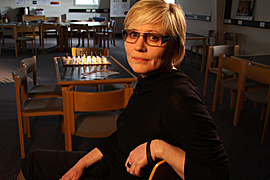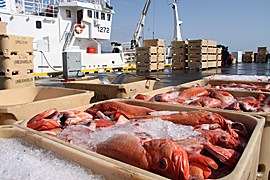Anger and uncertainty in Iceland
Economic woes mean nation once ranked one of the world’s happiest faces bleak future.

 |
| Iceland’s geothermal springs could help boost the country’s economy [Elizabeth Dunningham] |
Once ranked as the fourth happiest country in the world, Iceland’s prospects are now looking seriously bleak after its economy collapsed six months ago.
Iceland may have dropped a few notches from its recent high happiness rating. The mood now is characterised by anger and uncertainty.
The nation was also ranked as the world’s most developed country in 2007 by the United Nations Human Development Index, and its fourth most productive per capita.
Icelanders aren’t afraid of a spot of hard work. The problem these days, is that work is hard to come by.
Before the October banking crash, unemployment was around one per cent. Today it’s nearly 10 per cent. That’s a big chunk of a tiny population of a little over 300,000 people.
| In depth | ||
|
|
We took a drive out to one of a very few brand new unemployment centres. There was never much call for places like this before.
It’s located in the grounds of a disused United States naval air station beside Reykjavik’s, the capital, international airport. Ironically, the building once housed navy payroll staff.
Staffed by volunteers, the centre is doing a brisk trade in people wanting to learn new skills to fit back into Iceland’s shrinking workplace.
Outside were rows of smart cars, now worth far less than the foreign currency loans taken out to buy them. Inside, mostly women are learning to work in a kindergarten.
‘Everything has changed’
 |
| Olafia Olafsdottir set up her own business just before the crash [Elizabeth Dunningham] |
One of the volunteer staff is Olafia Olafsdottir, a well-groomed, American-educated interior designer, who set up her own business in the weeks immediately preceding the crash.
She hasn’t had a single client since.
“I think I could best describe it as the way I woke up one morning and I walked outside and I thought everything looks the same, but everything has changed,” Olafia said.
“My future as I planned it, it’s gone. I have no idea when it’s going to change, and I have no idea if it’s going to get worse before it starts to get better.”
The same questions are being asked everywhere, from the fishing grounds of the North Atlantic to the comfortable lecture halls of the University of Iceland.
Here, among the students hard at work, are signs of Iceland’s development status: infrared-controlled, white wall-mounted water fountains like something Apple would design, swish glass-walled study areas and lots of natural light.
The better for business students to examine the giant and very current case study going on all around them, best desribed as ‘Big Business: How NOT to do it’.
“I think the ethics should change,” one student said. “We should not only aim for profits,” said another.
Future growth
But it was Eirikur Tomasson, a fisherman in the town of Grindevik, an hour or so from Reykjavik, who seemed to nail where Iceland needs to head now.
 |
| Iceland will need to draw on its resources to aid its recovery [Elizabeth Dunningham] |
His seven fishing boats are good providers, but fishing, he knows, isn’t enough to keep the whole of Iceland in the fashion to which it’s become accustomed.
“We have to use all the resources we have,” he said. “Like geothermal heat and the rivers and the waterfalls and create electricity and sell it.”
Breathtaking vistas of glacial rivers and vast volcanic lava plains offer a clue to Iceland’s future growth.
Renewable energy, both geothermal and hydroelectric, account for most of the country’s energy needs. Developing technology in the field could make Iceland a world leader.
And there are tourists, lots of them, flocking to bathe in the warm sulphurous waters of the blue lagoon, a geothermal spa enclosed in volcanic rock under a cold arctic sky.
It’s an unmissable stop on a holiday exploring Iceland’s glaciers and lava plains, puffin-spotting or out and about on boats looking for whales, or devouring a delicious bowl of lobster soup.
And (although I probably shouldn’t say this) the Krona’s slide against leading world currencies means you no longer have to be the owner of a large investment bank to be able to afford a few very good Icelandic beers.

